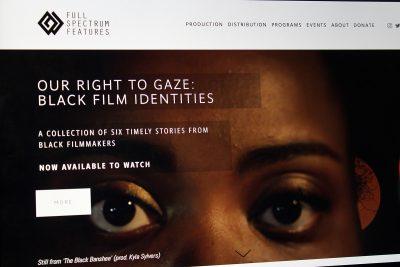In the Hollywood industry only 13 percent of directors are people of color, according to Full Spectrum Features NFP.

FSF, a Chicago-based nonprofit organization focused on equity in filmmaking, is determined to change those statistics. With the virtual cinema program “Our Right to Gaze: Black Film Identities,” the nonprofit is seeking to promote films made by Black filmmakers.
The virtual showcase premiered Sunday and will continue through Feb. 28 at various venues.
It features six short films from Black artists, with genres ranging from thrillers to wholesome, feel-good comedy.
The collection features films in which the “filmmakers gaze at themselves and their world, attempting to make sense of what they see reflected back,” according to the program page.
Sofia Villela, the communications and events manager at FSF, said the program was created with the different film organizations participating in the event, including Northwest Film Forum, The Luminal Theater and Circle Collective.
“We started having conversations around how can we radically support filmmakers in a time that we’re seeing it’s so easy for artists to be first on the chopping block,” Villela said.
Villela said each film organization wanted to support filmmakers in an industry that is currently unbalanced, she said, and the project was born as a means of fighting the inequity in the industry, especially when the pandemic has made the position vulnerable.
“We were trying to think about how could we flip that around and support marginalized artists that are trying to create a career out of this,” said Villela. “That’s where “Our Right to Gaze” came into play.”
One of the featured short films is “A Hollywood Party” directed by Toryn Seabrooks which shows the truth behind chasing your dreams in Hollywood with some added “Black comedy and humor,” Seabrook said.
“I made the film as a link to how things aren’t always as they’re cracked out to be when you meet your idols,” she said in an interview, “and how we strive to impress people even, even at our own personal expense, especially in Hollywood.”
Seabrooks said the program approached her, and she was grateful to be featured with other new Black filmmakers.
“I just said yes because it seemed like an amazing platform to feature new Black filmmakers like myself,” Seabrooks said. “Just being in a lineup with so many other incredible artists was an honor.”
She said she has been connected to the film industry for nearly her entire life — before she was even born, her father worked as a screenwriter and met her mother at Paramount Pictures — but, as a Black woman, she said she is glad to be active in the industry at the current moment, when people are ready to listen.
“I’m also coming up in a really powerful time where Black filmmakers are being recognized and being given a platform to share our work,” she said. “It’s been an empowering time as a Black filmmaker honestly, just by the grace of being born at the perfect time.”
The short film called “Nowhere” is also a part of the program, which follows a woman dealing with a toxic relationship and one night accidentally discovers a bondage, discipline, dominance and submission “underground” club, said the director of the film and self-proclaimed “filmmaker nut” Lin Que Ayoung.
“For me, what really moved me was understanding power dynamics in relationships, and in the world,” she said. “This one has to do with gender politics as well. I wanted to shed light on that.”
Ayoung said she was excited to hear about the showcase.
Being a Black woman in the film industry, and previously in the music industry, Ayoung said she has dealt with the challenges of making a name for herself in a field saturated by the white male gaze.
“I don’t want to be pigeonholed,” she said. “We have stories that are not just based on being gay or being Black or being a woman, we have stories, we have experiences that are just as valid as anybody else’s experiences, and we have yet to kind of get that out there.”
Viella said FSF hopes “Our Right to Gaze: Black Film Identities” continues to be shown in theaters even after Black History Month because people need to include Black narratives in collections.
“We’ve encouraged most of the cinemas to extend their runs past February as a message of: this is not just something that needs to happen in this one month,” she said. “We need to support Black filmmakers way past February.”
While there is a “Black Renaissance” happening in the film industry, Ayoung said she hopes it will not come to an end.
“It’s so important that places like “Our Right to Gaze: Black [Film] Identities” are here and are here to stay,” Ayoung said, “because it’s so important that these voices are heard well after this trend dies down.”

























































































































Mindy fitzgerald • Feb 18, 2021 at 11:38 am
Congrats on the great article. So very proud of you! ?. Great Grandma and grandpa Slavin would be very proud of you!